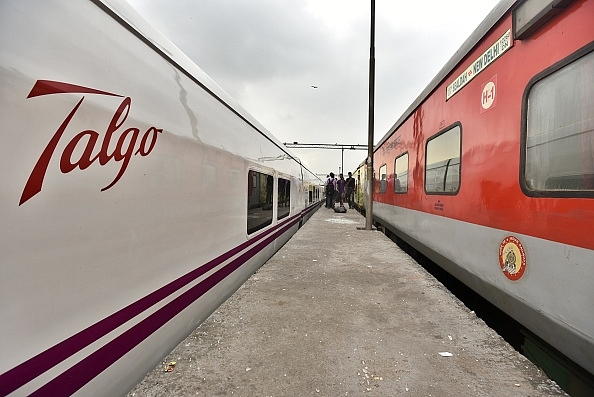Insta
Besides 40 ‘Made In India’ Vande Bharat, Railways To Float Rs 38,000 Cr Global Tender To Acquire 60 More Trains By 2022

A high-speed Talgo Train stands on a platform next to a Rajdhani Express in New Delhi, India. (Raj K Raj/Hindustan Times via Getty Images)
Indian Railway (IR) will shortly be floating a global tenders to acquire 60 160km/h tEMUs (Electric multiple unit) at an estimated cost of Rs 38000 crores for use on main line services, Rail Journal reported.
Seven of the aluminium-body distributed-traction trains will be imported, while the remainder is set to be manufactured in India under a technology transfer arrangement.
Rail Journal quoted a senior IR official as saying that the tenders will be issued anytime now so that the first of these fast-moving trains procured under the tender can commence commercial operations by 2022.
In 2016, IR unveiled Mission Raftaar a multi-pronged strategy for running high-speed trains (with a speed of over 300 kmph), semi high-speed trains (160 to 200 kmph), increasing the speed of existing trains and introducing train sets similar to Train-18.
As part of this project, IR will acquire 100 new trains by 2022. India’s fastest train – the Vande Bharat Express – currently clocks a top speed of 160km/h, while the Mail and Express trains can operate at up 70km/h.
As part of PM Narendra Modi’s flagship “Make-in-India” initiative, the Chennai-based Integral Coach Factory (ICF) – an in-house IR production unit – was awarded a Rs 40000 crore contract for the manufacture of 40 trains. The project was executed as a joint venture of Stadler Bussang AG (Switzerland) and domestic player Medha Servo Drives.
After ICF rolled out two train sets, which are now operational on the Delhi -Varanasi and the Delhi – Katra routes, Indian Railways decided not to manufacture any more Vande Bharat Express rakes in the current financial year.
According to the Indian Railway authorities, the decision to halt production in the current financial year was on technical grounds - the energy consumption of the train was much more than the world standards and as a product envisaged for mass production, such high energy consumption was not sustianble.
Railway Board Chairman Vinod Yadav however clarified that the technical issues with the train have been addressed and 40 more such trains will be produced till March 2022. He added that the ICF will produce 15 Vande Bharat trains between 2020 and 2021, and 25 in 2021-2022.
According to other media reports, IR decided to cancelled the contract and order a vigilance inquiry to investigate complaints after allegations emerged that tender documents were tweaked to favour Medha Servo Drives.
According to the 2016 tender conditions, the successful bidder was required to have Make-in-India-compliant facilities, as well as a minimum of five years’ experience of supplying G8 countries. The stringent tender pre-conditions prompted the Department of Industrial Policy and Promotion to write a letter to Ashwani Lohani, the then chairman of the Railway Board in March 2018 that it worked to the detriment of domestic manufacturing players.
According to senior IR official said the re-tendering decision is necessary in order to ensure wider participation in the bidding process.
During a recent interview to Economic Times, the Railway Board Chairman Vinod Kumar Yadav put forth Indian Railways’ ambitious privatisation plan for train operations.
As per Yadav, Indian Railways is hoping to introduce 150 privately run trains by FY24. These private operators would be expected to operate their own trainsets, introduce state of the art technology and innovative passenger amenities.
The private operators would have an option to either import their own train-sets or buy/lease them from Indian Railways.
Indian Railways is still working out the routes which will run these private trains and would float a bidding process after ironing out the specifics. As part of the 100 day plan, Railways would focus on routes with low congestion and connectivity to important tourist spots.
Support Swarajya's 50 Ground Reports Project & Sponsor A Story
Every general election Swarajya does a 50 ground reports project.
Aimed only at serious readers and those who appreciate the nuances of political undercurrents, the project provides a sense of India's electoral landscape. As you know, these reports are produced after considerable investment of travel, time and effort on the ground.
This time too we've kicked off the project in style and have covered over 30 constituencies already. If you're someone who appreciates such work and have enjoyed our coverage please consider sponsoring a ground report for just Rs 2999 to Rs 19,999 - it goes a long way in helping us produce more quality reportage.
You can also back this project by becoming a subscriber for as little as Rs 999 - so do click on this links and choose a plan that suits you and back us.
Click below to contribute.
Latest